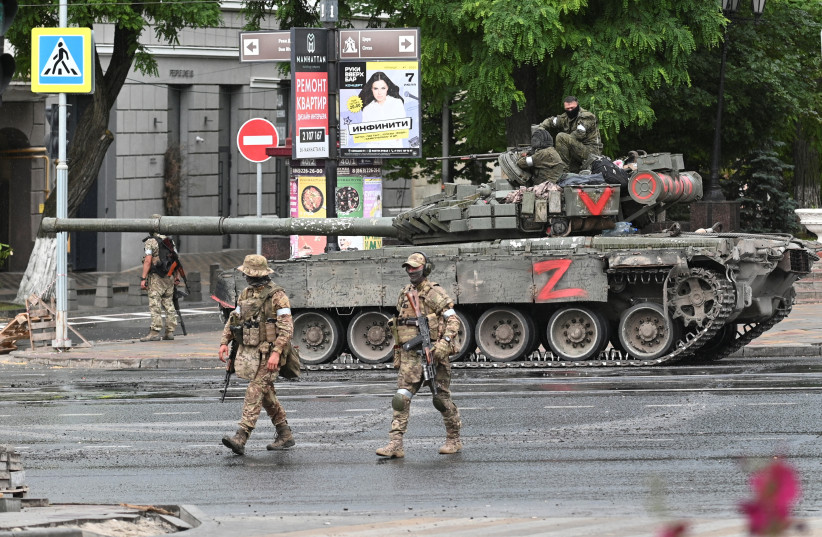In the wake of the rebellion in Russia over the weekend, Russian President Vladimir Putin is trying to portray a sense that all is well today.
However, Moscow also says it has no information on the whereabouts of Wagner leader Yevgeny Prigozhin, the BBC reported Tuesday. Prigozhin is in Belarus, and Putin has been holding meetings in the Kremlin, portraying himself as fully in charge. Wagner fighters may hand over heavy weapons and end up under the control of the regular army.
A lot is still not clear. Less clear is what happens to Wagner’s offices in Russia and its extensive network of contractors and mercenaries abroad. What is clear is that the rebellion showcases faultiness and problems in Russia.
Jerusalem Institute for Strategy and Security Iran expert Alex Grinberg was born in Moscow and has insights into what the rebellion illustrates about Russia’s current predicament. While the actual rebellion and crisis may be over for now, there are lessons, he emphasized in an interview.
Grinberg says one should see the Prigozhin incident “against the backdrop of this disorder and weakening of the Russian military.” He notes that it will be difficult for Ukraine to make progress against Russia’s defenses on the frontline unless Russia begins to suffer the types of incidents that could cause defense lines to collapse at the front.
Russia is now on the defensive in Ukraine but it has had time to put in place lines of defense – and armies that are on the defensive can often inflict high casualties on attackers because they have time to prepare the ground.

Russia's military failure
On the other hand, the Russian military was not assertive in putting down the Wagner rebellion, a sign that it was uncertain as to who actually held power, Grinberg notes. “The Russian military has always been wary of involvement in politics.”
Grinberg compares the situation of Russia today to the First World War when the tsar’s army made progress against the Germans and Austrians but suffered high casualties and eventually the army collapsed.
“They sustained so many casualties the Russians stopped fighting and turned back to Russia.” This took place as Russia fell into revolution.
He also says that the rebellion, or what Moscow sees as “mutiny,” illustrates cracks in the image of Moscow’s rule.
“We all saw that Putin’s authority as the iron man who controls Russia is hollow, no one really knows what he controls.”
Grinberg contrasts this with the Soviet era where it would be unimaginable to have a whole division of the army simply leave the front line and march on Moscow. Wagner’s forces shot down helicopters and planes, according to reports.
Another aspect of the affair is that Prigozhin insulted Putin in the most vulgar way, using words that cannot even be used here. Usually, “whoever says that in Russia would [suffer consequences], but he [Prigozhin] has a private army at his disposal.” The whole Putin-Prigozhin affair doesn’t inspire confidence among soldiers to sacrifice for this edifice.
Another lesson is that when Putin is under pressure he will not escalate. Grinberg points out that the West has generally been concerned about escalating too much against Moscow. But this incident makes it seem Putin does not know how to lead.
“He’s trying to be a Soviet-style dictator without Soviet means.”
This, Grinberg says, teaches us another lesson, that “the Russian system is not a system, it’s a bluff; they didn’t foresee such a possibility. They were caught unready for such a thing as Prigozhin.”
What this means is that Russia’s leadership has elements of a kind of mafia state. It’s as if a country was run by cartels, as were once very powerful in the Americas.
“They [cartels] may be efficient, but unlike Soviet leaders who were politicians, they are not. They never have a contingency plan. When you face [the] mafia they don’t understand the simple balance of power, you can’t foresee what will be their next step because this is how they behave.
The Russian military top brass is not West Pointers [US Military Academy graduates], to put it mildly, they can act with brutal force but when they are denied that force they don’t know what to do,” the expert says.
The war will continue and Ukraine will still face an uphill struggle because Russia still has large numbers of soldiers. The crisis also revealed that it is unclear, if Putin falls from power, what might come next.
“If you look at all the guys around Putin, they are not better. It’s another thing, there is no way to stop this protracted attrition war, there can be negotiation – not for peace but for force and power. I’m not sure anyone in the West has a clear understanding of what to do next,” Grinberg says.
That means the conflict may remain a “frozen” conflict in Ukraine without an end or way to end it.
Putin may be weaker today and he is isolated in the Kremlin.
Soldiers on the front or their commanders will not report problems up the chain of command due to the culture of the Russian military way of doing things. The Prigozhin affair has taught us some lessons about Russia, but much remains to be seen in terms of what the long term will bring at the front and in Moscow.
